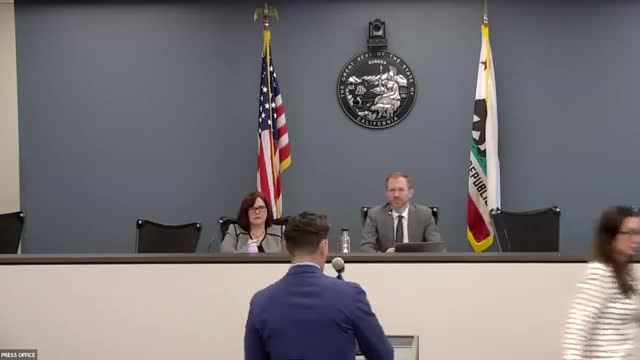Calif. privacy hearing features split over automated decision-making rules and behavioral-advertising opt-out
Get AI-powered insights, summaries, and transcripts
Subscribe
Summary
At a Jan. 14 public comment session, privacy advocates pressed the California Privacy Protection Agency to keep strong opt-out and worker protections for automated decision-making technologies, while industry and business groups warned the proposed rules would impose large costs and exceed the agency's authority.
The California Privacy Protection Agency (CPPA) held a public comment hearing on Jan. 14, 2024, in Sacramento on proposed regulations covering automated decision‑making technology (ADMT) and behavioral advertising, drawing sharply divided testimony from civil‑rights and labor advocates on one side and business and advertising groups on the other.
Supporters of strong ADMT rules said the regulations are needed to protect people — especially workers, renters and marginalized communities — from opaque algorithmic systems. Jake Snow, senior staff attorney at the American Civil Liberties Union of Northern California, told the agency, "Technology can make life better for Californians, but only if it is built carefully and used thoughtfully to empower people and address systemic challenges." Annette Bernhardt of the UC Berkeley Labor Center urged expanded notice, access and opt‑out rights for workers and stronger risk‑assessment requirements before systems are deployed.
Business groups and advertising trade associations countered that the draft rules were overly broad and would harm innovation and small businesses. Alex Torres of Brownstein Hyatt Farber Schreck, speaking for the Bay Area Council, said, "The Bay Area is the birthplace of innovation," and warned the rules' expansive scope "will have a dampening impact on innovation" by increasing compliance costs and discouraging testing of algorithms in California. Several speakers cited the agency's standardized economic analysis—repeated in testimony as a $3,500,000,000 implementation cost and roughly $1,000,000,000 in annual recurring costs—and warned of job losses and business exits if the rules remain as drafted.
Opponents also argued the proposed behavioral‑advertising provisions would improperly regulate first‑party advertising and exceed the CPPA's statutory authority. Lou Mastria of the Digital Advertising Alliance said the regulations "exceed the scope" of the law and would create an expensive compliance apparatus that could pick winners and losers in the marketplace. Multiple organizations asked the agency to narrow definitions of ADMT and "significant decision," limit opt‑out rules to high‑risk, consumer‑impacting decisions, and defer or align contentious provisions with forthcoming legislative action.
The hearing also featured calls from civil‑rights and labor advocates to preserve and strengthen opt‑out rights and to make sure ADMT rules address workplace harms. Swati Chintala of Tech Equity described opaque systems as having "profound equity implications" for workers and renters, and urged the CPPA to ensure meaningful opt‑out and notice rights.
The CPPA staff and board did not debate the substance during the hearing; the session recorded oral comments that will be considered with written comments and responded to in the agency's final statement of reasons. The public comment period remains open through Feb. 19, 2024, and the agency will hold a second hearing on Feb. 19 from 2 to 6 p.m. in the same Sacramento location and via Zoom.
